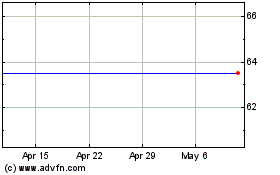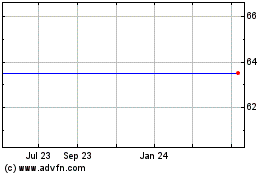Industrial Cos See Acquisitions As Hedge Against Slower '11 Growth
December 30 2010 - 7:00AM
Dow Jones News
Industrial companies--flush with cash and lean on debt--are
loading up on acquisitions in anticipation of slower sales and
profit growth next year.
The Federal Reserve Bank expects U.S. industrial production to
grow 4.3% in 2011, 20% less than this year's growth rate, as
companies rebuilt inventories depleted by 2009's economic
recession. Next year's slower output will likely translate into
more modest performance for many companies whose revenue and income
this year increased by more than 10% from 2009.
"2010 was a big recovery year. It's going to be harder to get
that growth over the next couple of years. You can get it by
acquiring another company," said Walt Liptak, an industrial analyst
for Barrington Research in Chicago. "The deals are starting to
happen."
Some of the biggest spenders of 2010 included companies that
have mostly abstained from major acquisitions in the past, such as
Caterpillar (CAT), and Tyco International Ltd. (TYC), as well as
regular shoppers like Emerson Electric Co. (EMR) that had
reputations for being cost-conscious buyers.
After routinely being outbid by private equity firms a few years
ago, chief executives are now paying premium prices for businesses
with better growth outlooks than their companies' core operations.
The median price paid this year for acquisitions by multi-industry
conglomerates equates to two times the acquired companies' trailing
annual sales. That's the highest deal multiple in more than a
decade and is up from 1.2 times in 2009, according to Deutsche Bank
Securities Inc.
Ironically, the severe downturn in 2009 provided companies with
the motivation and resources to become more aggressive buyers. When
their sales tanked in late 2008, companies slashed payrolls and
overhead expenses, eliminated debt and piled up cash.
Multi-industry companies' net debt to market capitalization is at
an all-time average low of 11%. Coming out of the last recession in
2003, it was 27%. Moreover, their cash holdings amount to 8% of
their combined market capitalization.
This unprecedented buying power is prompting some observers to
warn that purchase prices could easily become overheated next year,
especially if returns on acquisitions begin to weaken. At the
moment, though, it's a risk that companies appear willing to
take.
With an uncertain end to the slump in U.S. housing and
commercial construction, Caterpillar plunged deeper into the mining
sector by buying mining equipment maker Bucyrus International Inc.
(BUCY) in November. Chairman and Chief Executive Doug Oberhelman
concluded that developing countries' increasing consumption of
coal, copper and other mined commodities will support prolonged
demand for more mining equipment.
"We think it's a great time to invest in mining," Oberhelman
said during a conference call with analysts Nov. 15. "All of us
have been to China, India, Africa, and certainly Brazil--everywhere
you go, modernization is occurring as the middle class strives to
progress. We like that."
With a price tag of $7.6 billion, Bucyrus is the most expensive
acquisition in Caterpillar's history. Illinois-based Caterpillar,
which already builds big haul trucks for mines and quarries, is
counting on Bucyrus providing as much as $400 million a year in
cost savings and growth opportunities for Caterpillar, starting in
2015. It's a goal that some view as a stretch, given the
traditional boom-and-bust cycles for mining equipment caused by
volatile commodity prices.
"There's not a lot of margin for error in that deal because of
what they paid for it," said Adam Fleck, an analyst for research
firm Morningstar Inc.
Profitable public companies with desirable business lines are
inevitably requiring full-price offers to convince investors to
part with their shares. ABB Ltd.'s (ABB, ABBN.VX) $63.50-a-share
offer for electric motor manufacturer Baldor Electric Co. (BEZ) is
15% above Baldor's all-time high stock price. Baldor's stock price
had already climbed about 60% this year before ABB agreed in
November to pay a 41% premium for the Arkansas company's
shares.
"It could have been a bit cheaper, but from a strategic
standpoint, it's a good deal" for ABB, said Samuel Eisner, an
analyst in New York for Sterne Agee & Leach.
The Swiss company's willingness to pay up for Baldor was likely
influenced by the company's failed attempt this summer to buy
Chloride Group PLC, a U.K.-based maker of backup power systems for
computer server centers.
ABB dropped out of a bidding war for Chloride with Emerson,
whose $1.5 billion offer for Chloride amounted to roughly 22 times
Chloride's projected 2011 pretax earnings and about a 90% premium
to Chloride's average stock price in the three months before the
bidding commenced.
Emerson has spent about $4 billion on acquisitions over the last
18 months, much of it on deals to expanded the St. Louis, Mo.,
company's presence in the equipment market for computer server
centers. The $8-billion-a-year global market for backup power
systems has been growing 6% to 8% a year, roughly twice the rate of
other industrial sectors.
Other companies also have fortified positions in their
most-appealing markets. Tyco expanded its leading share of the
North American market for home alarm systems by buying rival
Brink's Home Security Holdings in a stock-and-cash deal worth $2
billion. It was Tyco's largest acquisition since former CEO L.
Dennis Kozlowski resigned in June 2002, following a decade of
high-flying deal-making that left the company with a mountain of
debt and dozens of inefficient and incompatible businesses.
"We've been through a horrendous downturn and all these
companies have prudently deleveraged their balance sheets," said
Deane Dray, a analyst for Citi Investment Research. "Now, they have
the balance sheet room and the ability to do more deals."
-By Bob Tita, Dow Jones Newswires; 312-750-4129;
robert.tita@dowjones.com
Baldor (NYSE:BEZ)
Historical Stock Chart
From Mar 2024 to Apr 2024

Baldor (NYSE:BEZ)
Historical Stock Chart
From Apr 2023 to Apr 2024
